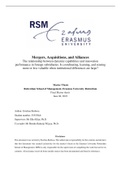Mergers, Acquisitions, and Alliances
The relationship between dynamic capabilities and innovation
performance in foreign subsidiaries. Is coordinating, learning, and sensing
more or less valuable when institutional differences are large?
Master Thesis
Rotterdam School of Management, Erasmus University Rotterdam
Final Master thesis
June 06, 2022
Author: Ewelina Barbosa
Student number: 555538eb
Supervisor: Mr Elko Klijn, Ph.D.
Co-reader: Mr Hendra Raharja Wijaya, Ph.D.
Disclaimer
This document was written by Ewelina Barbosa. The author takes responsibility for the contents and declares
that this document was created exclusively for the master’s thesis at the Erasmus University Rotterdam
School of Management. RSM is only responsible for the supervision of completing the work but not for its
contents. All assistance received from outside sources has been documented and listed in references.
,Preface
With a smile and a sigh of meaningful accomplishment, I present my master thesis
dedicated to the subsidiary's dynamic capabilities (DCs) and its innovation performance (IP)
and moderating roles of Government Effectiveness (GE) and Indulgent vs Restraint (IVR).
This research paper is the final work of partial fulfilment of the Strategic Management Program
at Rotterdam School of Management, Erasmus University, in the 2021/2022 academic year.
As a wise person once said, "Research is what I'm doing when I don't know what I'm
doing" (von Braun W., 1912-1977, as cited in Fuller, 1994, p.215)— these words fully describe
several challenges I faced during the writing process. In 20/20 hindsight, I can clearly state that
these challenges occurred due to limited practical research experience and advanced statistical
techniques. Nevertheless, they created a stimulus for additional research and self-study.
Besides the significant inspiration and motivation, my supervisor's endless support
helped me finish my thesis. The help received, either for the substance or the analysis itself,
allowed me to conquer the obstacles I faced and better understand my capabilities and self-
imposed boundaries. Therefore, I offer my sincerest and enormous gratitude to dr. Elko Klijn.
Also, I would like to acknowledge my thesis co-reader, dr. Hendra Raharja Wijaya,
who provided valuable feedback and useful comments on the early drafts of this paper.
Lastly, I would like to thank my family, especially my daughter, who has developed
and represented an enormous strength in being patient during the last couple of years. Her
emotional support and continuous inspiration have been oscillating with greater amplitude at
high frequencies, allowing me to conquer life's adversity and start to live the life I truly desired.
Ewelina Barbosa
Rotterdam, June 06, 2022
-2-
,“It always seems impossible until it’s done” – N. Mandela.
-3-
, Abstract
The scan and assessment of an unfamiliar institutional environment and its influence
on the effect of the subsidiary's dynamic capabilities (DCs) on its exploration and exploitation
are required to fully embrace potential market opportunities and get better insights regarding
existing interdependencies. Drawing on prior research in strategic management and analysing
datasets from 2010 and 2011 with 445 observations of foreign subsidiaries, this study applies
institutional theory and enriches existing literature by providing more support for informal —
Indulgent vs Restraint (IVR) and formal institutions — Government Effectiveness (GE), as
well as for the association between DCs and innovation performance (IP). In short, the research
reveals a positive relationship between the subsidiary's DCs and exploration and exploitation.
However, the Government Effectiveness (GE) and Indulgent vs Restraint (IVR) show negative
moderating effects on the aforementioned association. The result indicates that if the parent
company establishes its subsidiary intending to increase its exploration, then a thorough
evaluation of the region and public authorities and societal norms/beliefs should be conducted
since a distinct institutional environment has a negative and significant impact on the
relationship between the subsidiary's DCs and exploration and exploitation. However,
lawmakers and society might improve this negative moderating effect by ameliorating the
quality of the policies, regulations, social norms/beliefs, and behaviours, thereby improving
the institutional environment's effectiveness on local and foreign subsidiary IP.
Keywords: dynamic capabilities, formal and informal institutions, institutional theory, foreign
subsidiary, innovation performance, exploration, exploitation, government effectiveness, indulgent vs
restraint, multinational corporations.
-4-





